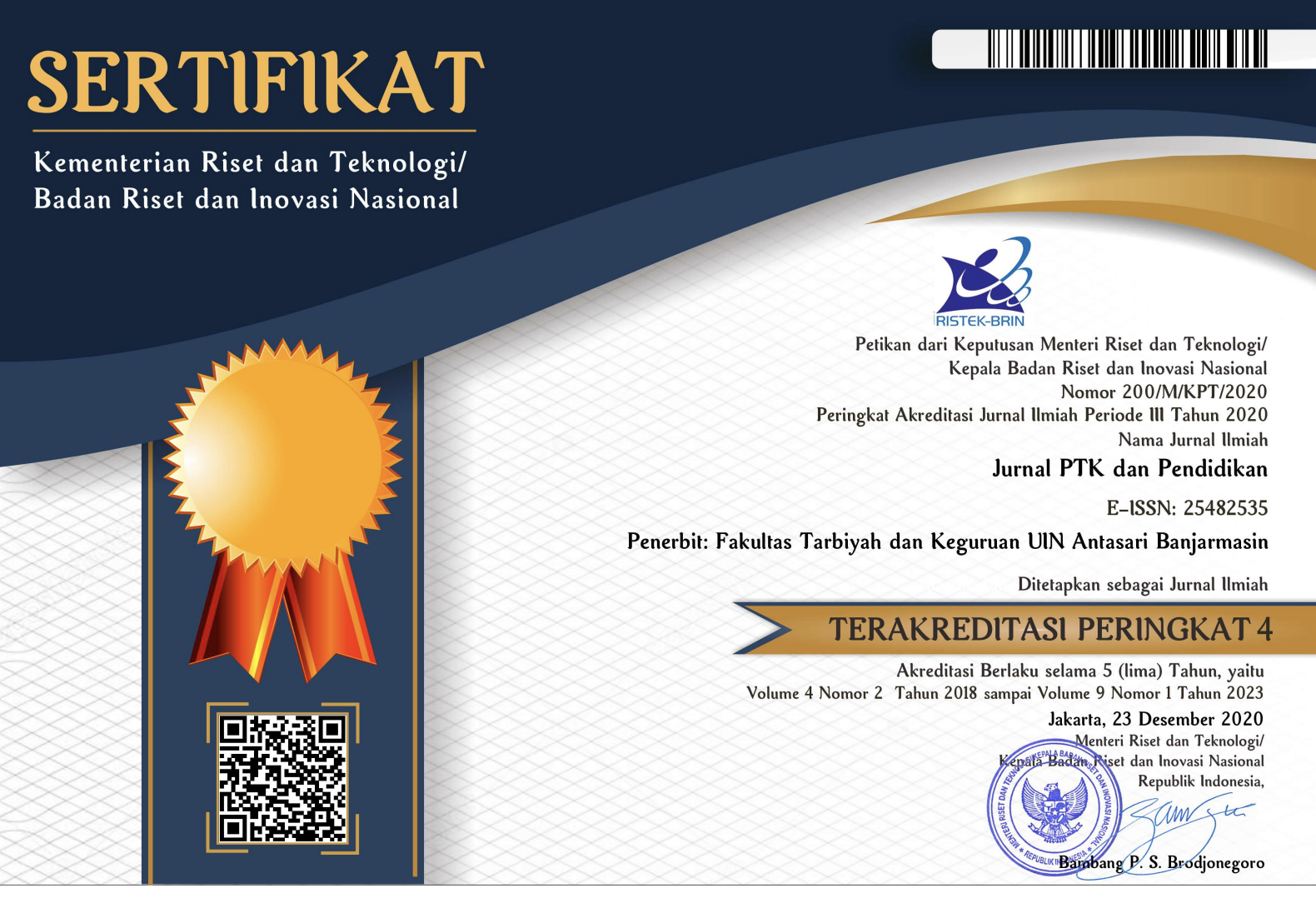LEARNING CREATIVE PROBLEM-SOLVING MODEL WITH GUIDED INQUIRY STRATEGY TO IMPROVE STUDENTS' CONCEPT MASTERY
DOI:
https://doi.org/10.18592/ptk.v11i1.12528Keywords:
CPS learning model; classroom action research; environmental pollutions;Abstract
Categories of learning outcomes include acceptance, response, assessment, organization, and pattern formation. Thus, the essence of learning is a change in thinking that affects behaviour. The results of interviews with teachers at SMA Kartika XIII-I Ambon show that current students have not shown an environmentally conscious attitude. Therefore, research was conducted to improve the mastery of the concept of class X students on environmental pollution material using creative problem-solving learning models with guided inquiry strategies. This study used a classroom action research method that took place in two cycles for one month. The subjects in this study were 26 students. The research data were processed descriptively on the results of cognitive, affective, and psychomotor assessments. The results showed that in cycle I there were still 65.4% of students who had not achieved mastery of concepts on environmental pollution material. Therefore, the research was continued in cycle two with the action of using the creative problem-solving learning model based on guided inquiry strategy and coupled with audio-visuals media, as well as a stimulus in the form of giving rewards to active students. It was proven that in cycle II there was an increase in students' mastery of concepts in environmental pollution material in students by 100% so that the series of class action research was no longer continued. In conclusion, the use of learning modelsReferences
Ardhita, T. D., Zahara, R., & Ilyas. (2019). Penerapan metode inkuiri terbimbing untuk meningkatkan kemampuan Analisis Siswa dalam Mata Pelajaran Ekonomi. Jurnal Pendidikan Dan Pembelajaran Ekonomi Akuntansi, 5(2), 144–152. https://jurnal.fkip.unla.ac.id/index.php/jp2ea/article/view/331
Asmidar, A. (2019). The Effect of Creative Problem Solving Model toward Students Learning Activities and Learning Outcomes of Science Learning. 178(ICoIE 2018), 92–94. https://doi.org/10.2991/icoie-18.2019.22
Asni, A., Wildan, W., & Hadisaputra, S. (2020). Pengaruh Model Pembelajaran Inkuiri Terbimbing Terhadap Hasil Belajar Kimia Siswa Materi Pokok Hidrokarbon. Chemistry Education Practice, 3(1), 17. https://doi.org/10.29303/cep.v3i1.1450
Astuti, D., & Fauziah, M. (2021). PENGUASAAN KONSEP SISWA DALAM PENDEKATAN INTERACTIVE CONCEPTUAL INSTRUCTION (ICI) DENGAN VIDEO PEMBELAJARAN. IBTIDA Jurnal Kajian Pendidikan Dasar, 1(2), 1–17. https://doi.org/https://doi.org/10.33507/ibtida.v1i2.329
Bahrudin, J. (2020). Penerapan Model Pembelajaran Creatif Problem Solving untuk Meningkatkan Hasil Belajar Teknologi Layanan Jaringan Materi Ragam Aplikasi Komunikasi Data. Journal of Education Action Research, 4(4), 536. https://doi.org/10.23887/jear.v4i4.28924
Choirul Amri, & Dimas Kurniawan. (2023). Strategi Belajar & Pembelajaran Dalam Meningkatkan Keterampilan Bahasa. Journal of Student Research, 1(1), 202–214. https://doi.org/10.55606/jsr.v1i1.980
Halek, E. F., Oetpah, V., & Seran, Y. (2016). Siswa Melalui Model Pembelajaran Inkuiri. Jurnal Pendidikan: Teori, Penelitian, Dan Pengembangan, 1, 2047–2049.
Harefa, D., Efrata Ge’e, Kalvintinus Ndruru, Mastawati Ndruru, Lies Dian Marsa Ndraha, Tatema Telaumbanua, Murnihati Sarumaha, & Fatolosa Hulu. (2021). Pemanfaatan Laboratorium Ipa Di Sma Negeri 1 Lahusa. EduMatSains : Jurnal Pendidikan, Matematika Dan Sains, 5(2), 105–122. https://doi.org/10.33541/edumatsains.v5i2.2062
Lewe, R. N. A. L., Sholikhan, & Pratiwi, H. Y. (2020). Implementasi Model Inkuiri Terbimbing untuk Meningkatkan Motivasi dan Prestasi Belajar Fisika Siswa. Jurnal Terapan Sains Dan Teknologi, 2(1), 1–7.
Magdalena, I., Nurul Annisa, M., Ragin, G., & Ishaq, A. R. (2021). Analisis Penggunaan Teknik Pre-Test Dan Post-Test Pada Mata Pelajaran Matematika Dalam Keberhasilan Evaluasi Pembelajaran Di Sdn Bojong 04. Jurnal Pendidikan Dan Ilmu Sosial, 3(2), 150–165. https://ejournal.stitpn.ac.id/index.php/nusantara
Malisa, S., Bakti, I., & Iriani, R. (2018). Model Pembelajaran Creative Problem Solving (Cps) Untuk Meningkatkan Hasil Belajar Dan Kemampuan Berpikir Kreatif Siswa. Vidya Karya, 33(1), 1. https://doi.org/10.20527/jvk.v33i1.5388
Merta, L. M. (2021). Peningkatan Motivasi Belajar Dan Penguasaan Konsep Kimia Pada Topik Hidrolisis Garam Dan Larutan Penyangga Melalui Pembelajaran Inkuiri Terbimbing. Jurnal Pendidikan Dan Pembelajaran Sains Indonesia (JPPSI), 4(1), 1–12. https://doi.org/10.23887/jppsi.v4i1.30048
Pramestika, R. A., Suwignyo, H., & Utaya, S. (2020). Model Pembelajaran Creative Problem Solving pada Kemampuan Berpikir Kreatif dan Hasil Belajar Tematik Siswa Sekolah Dasar. Jurnal Pendidikan: Teori, Penelitian, Dan Pengembangan, 5(3), 361. https://doi.org/10.17977/jptpp.v5i3.13263
Putri, R. (2020). Efektifitas Pembelajaran Berbasis Inquiry Untuk Meningkatkan Penguasaan Konsep Dan Kemampuan Berpikir Kreatif Mahasiswa Farmasi Pada Mata Kuliah Anatomi Fisiologi Manusia. Jurnal Biolokus, 3(2), 298. https://doi.org/10.30821/biolokus.v3i2.754
Ramadhan, F. A. (2021). Penggunaan Strategi Pembelajaran Inkuiri Terbimbing dalam Pembelajaran IPA di Pendidikan Sekolah Dasar. VEKTOR: Jurnal Pendidikan IPA, 2(2), 56–66. https://doi.org/10.35719/vektor.v2i2.35
Sarumaha, M., & Harefa, D. (2023). Model Pembelajaran Inquiry Terbimbing Terhadap Hasil Belajar Ipa Terpadu Siswa. Ndrumi : Jurnal Ilmu Pendidikan Dan Humaniora, 5(1), 27–36. https://doi.org/10.57094/ndrumi.v5i1.517
Sumaryati, S.-, Muhtar, M.-, & Sururi, R. Y. (2022). Optimization of Problem-Solving Skills Through the Application of Creative Problem-Solving Models Assisted By Accounting Cards. Assets: Jurnal Akuntansi Dan Pendidikan, 11(1), 78. https://doi.org/10.25273/jap.v11i1.7213
Downloads
Published
How to Cite
Issue
Section
License
Copyright (c) 2025 Tri Santi Kurnia

This work is licensed under a Creative Commons Attribution 4.0 International License.
- The right to publication of all journal material published on the Jurnal PTK dan Pendidikan website is held by the editorial board with the author's knowledge (moral rights remain the property of the author).
- The formal legal provisions for access to digital articles of this electronic journal are subject to the terms of the Creative Commons CC BY 4.0 DEED Attribution International (CC BY) license. This license enables reusers to distribute, remix, adapt, and build upon the material in any medium or format, so long as attribution is given to the creator. The license allows for commercial use.
- Printed and electronic published manuscripts are open access for educational, research and library purposes. In addition to these objectives, the editorial board shall not be liable for violations of copyright law.






